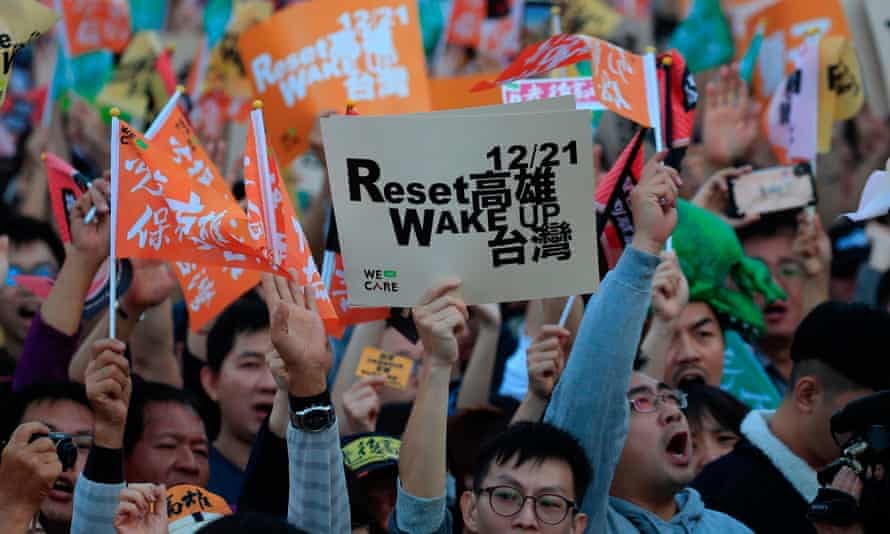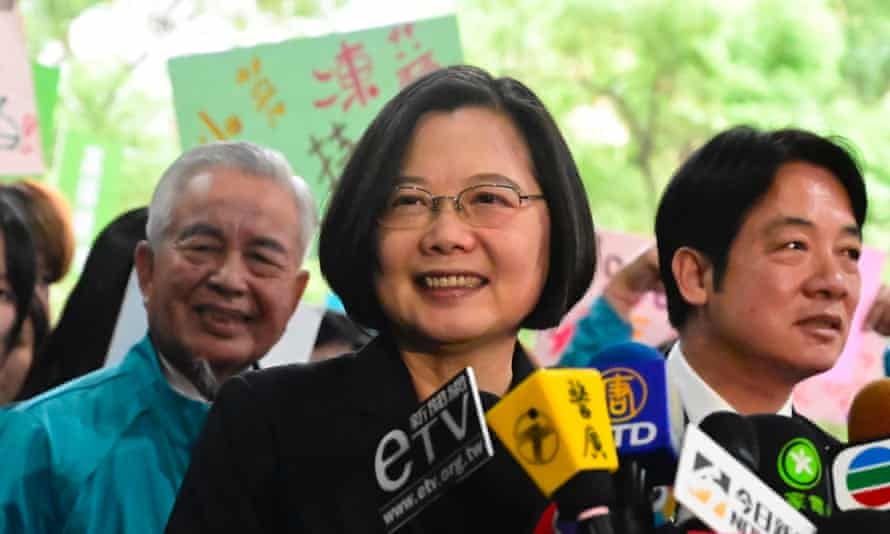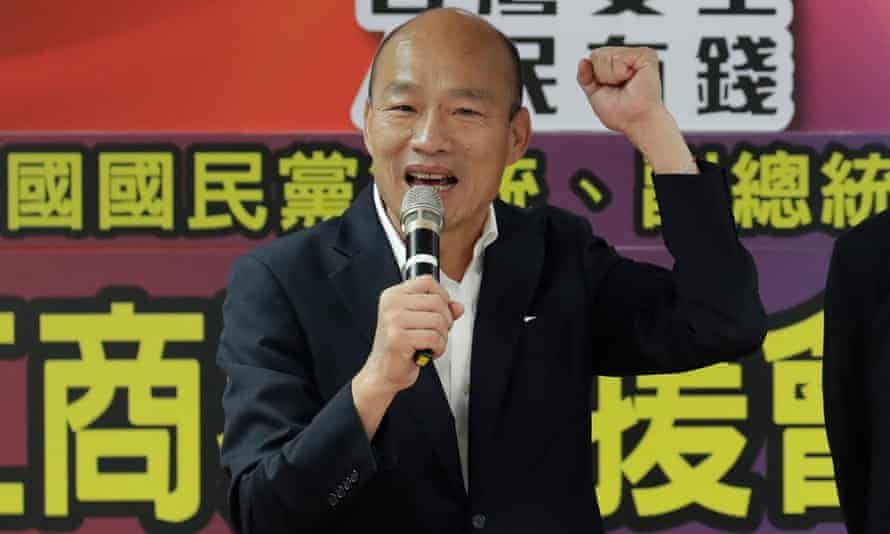【衛報】Taiwan's citizens battle pro-China fake news campaigns as election nears
【2020 衛報 Taiwan/Asia Pacific/news】
Contest is in effect a referendum on the future of the self-governed island’s relationship with China
 Protesters against Taiwan’s KMT presidential candidate Han Kuo-yu during a protest in Kaohsiung Photograph: Ritchie B Tongo/EPA
Protesters against Taiwan’s KMT presidential candidate Han Kuo-yu during a protest in Kaohsiung Photograph: Ritchie B Tongo/EPA
Lily Kuo in Beijing and Lillian Yang
Mon 30 Dec 2019 05.00 GMT
Citizen groups in Taiwan are fighting a Russian-style influence and misinformation campaign that is believed to originate across the strait in mainland China with just weeks to go before it votes for its next president,
Taiwan goes to the polls on 11 January to decide between two main candidates, incumbent president Tsai Ing-Wen of the Democratic Progressive party (DPP) under whom ties with Beijing have become fraught, and Han Kuo-Yu of the Kuomintang party (KMT), which advocates closer engagement with China.
The contest is in large part a referendum on the future of Taiwan’s relationship with Beijing, which sees the self-governed island as a renegade province that one day must return to the fold. Han is Beijing’s favoured candidate while Tsai’s party has been campaigning on the slogan: “Resist China, Defend Taiwan”. In a televised debate with her rivals for the job on Sunday, Tsai said China’s “expanding ambitions” were the biggest threat to its democracy.
 Taiwan’s President Tsai Ing-wen Photograph: Sam Yeh/AFP via Getty Images
Taiwan’s President Tsai Ing-wen Photograph: Sam Yeh/AFP via Getty Images
Citizen groups in Taiwan say the openness of one of the freest societies in Asia is being used against it by groups in China to wage an online disinformation campaign, made more potent by their shared language, Mandarin. A recent study by the V-Dem Institute at the University of Gothenburg in Sweden found that Taiwan was the most exposed to foreign dissemination of false information.
False reports include claims Tsai’s doctorate degree was fake or that Hong Kong democracy activist Joshua Wong kicked an elderly man when he visited Taiwan in October and met members of the DPP.
“China has multiple ways of pushing misinformation. We’ve found that content mills are no longer simply producing fake information. More and more, they are manipulating opinions,” said Jarvis Chiu, senior manager for the Institute for Information Industry, which has been assisting government efforts to prevent disinformation.
According to Chiu, an army of trolls will leave thousands of comments under a candidate’s post or a news article, shifting the focus of the debate. Fake social media accounts also share pro-Beijing content or inflate the number of likes such content gets. “Subliminal attacks” include repeatedly searching for one candidate’s name to influence search algorithm results.
“China won’t give up this practice. It will only increase and because it is non-military, it won’t get much global attention,” Chiu said.
The uncertain status of Taiwan, functionally independent but not internationally recognised, has been an issue in every campaign since direct elections were introduced in the 1990s following decades of martial law under the KMT.
 Taiwan’s KMT presidential candidate Han Kuo-yu speaks during a campaign event in Taipei Photograph: Ritchie B Tongo/EPA
Taiwan’s KMT presidential candidate Han Kuo-yu speaks during a campaign event in Taipei Photograph: Ritchie B Tongo/EPA
This year, the question of how Taiwan should deal with Beijing looms even larger after years of increasingly strident rhetoric from China. On Thursday, China sailed its new aircraft carrier, Shandong, through the Taiwan Strait in a move critics described an effort to intimidate voters. Months of witnessing Beijing’s inflexible response to protesters in Hong Kong have cast even more doubt on the city’s “one country, two systems” framework, once touted as a possible model for Taiwan.
“There’s a sword hanging over everyone all the time,” said Shelley Rigger, a professor of east Asian politics with a focus on Taiwan at Davidson College. “It’s exhausting to know that you’re being threatened and that the entity that is threatening you is getting more and more powerful all the time.”
In an attempt to push back against the campaign, citizen watchdog groups are manning social media, debunking rumours and trying to trace questionable content back to its source. Prosecutors have been charging those who spread disinformation. The party in office is trying to pass a law that would prohibit support from foreign “infiltration sources” to a political party.
“Taiwanese people have only just started understanding what is happening. It’s still the very beginning,” said Summer Chen, of Taiwan FactCheck Center which works on debunking disinformation on Facebook. “It is a crisis and all of Taiwan needs to be researching this.”
A series of snappy Youtube tutorials educate viewers on the nature and methods of disinformation warfare. “Taiwan has become the main laboratory for information warfare from China. If China wants to practice its methods, Taiwan is the starting point,” Puma Shen, who runs DoubleThink Labs, which monitors how false information, explains in one of the videos.
Those working on the issue say it is difficult to definitely say these attacks originated in China or link them to Chinese state actors, which makes the work of raising awareness harder.
“I believe that there is cooperation with China, but how much China knows, how much of this is from the Chinese government or people in Taiwan who are pro-China, we don’t know,” said Vivian Chen, a recent graduate studying medicine from Taipei.
China’s efforts to influence events in Taiwan stretch a long way back and go beyond online information warfare, to include traditional media, incentives for citizens or businesses who cooperate with China, group trips and donations to temples and other grassroots organisations.
Last month when Chinese defector Wang Liqiang detailed ways he had been instructed to interfere in Taiwan’s midterm elections in 2018 as well as the upcoming race, few in Taiwan were surprised.
“The story was not as shocking in Taiwan as it was in other parts of the world,” said Lev Nachman, a PhD candidate at the University of California, Irvine, studying social movements and focusing on Taiwan. “It is not news to Taiwanese people that China has been co-opting local organisations for political influence.”
Observers say it is unlikelyefforts to influence voters will affect the outcome of the race, where voters will also choose representatives for the legislature. According to polls, Tsai is ahead of her rival, helped by months of protests in Hong Kong and concerns about Beijing, and an improved economy.
報導網址





